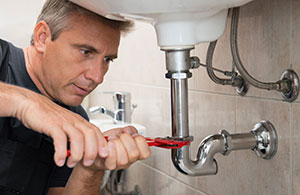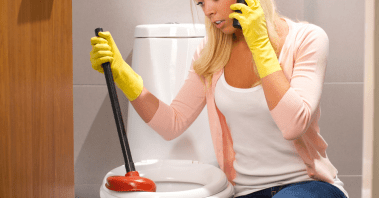Steps to Handle Emergency Plumbing Issues Before Professional Help Arrives
Steps to Handle Emergency Plumbing Issues Before Professional Help Arrives
Blog Article
The author is making a number of great pointers on the subject of What to Do During a Plumbing Emergency as a whole in this content just below.

Pipes emergency situations can strike at any time, creating anxiety and potential damages to your home. Whether it's a ruptured pipe, a clogged drainpipe, or a leaky faucet, recognizing exactly how to handle the scenario until an expert plumber shows up can conserve you from further issues. This write-up offers crucial emergency pipes pointers to help you alleviate damages and regain control during a plumbing dilemma.
Switch off the Water Supply
The primary step in any kind of pipes emergency is to turn off the water system. For local concerns, such as a leaking tap or commode, turn off the valve near the fixture. When it comes to a significant leakage or burst pipe, locate your home's primary water shut-off shutoff and transform it off quickly. Recognizing the location of these valves beforehand can save important time during an emergency.
Turn off Your Hot Water Heater
In certain emergencies, such as a burst pipe, it's smart to turn off your hot water heater. This stops getting too hot or damages to the device when water quits moving. Switch off the power supply to the hot water heater (electrical or gas) and allow it cool to stay clear of possible threats.
Momentarily Quit a Ruptured Pipeline
A ruptured pipe can result in considerable water damage in minutes. To reduce the problem:
Call a professional plumbing professional promptly to deal with the problem completely.
Have an Emergency Pipes Set
Prepare a basic pipes emergency package to manage small problems effectively. Your package ought to consist of:
Having these tools on hand can make a substantial difference in your capacity to manage emergency situations.
Unclog Drains Securely.
A clogged drainpipe can be a frustrating and untidy concern. Here's just how to tackle it:.
If these approaches don't work, stay clear of using excessive pressure, as it might worsen the blockage.
Handle Overflowing Toilets.
An overruning toilet can cause instant turmoil. Below's what you should do:.
Address Small Leaks with Short-term Repairs.
Little leaks can rapidly end up being considerable issues if left untreated. Utilize these momentary repairs up until expert assistance shows up:.
While these repairs aren't permanent, they can aid reduce water loss and damage.
Take Care Of Frozen Water Lines Meticulously.
In chillier climates, icy pipes are a common emergency. If you believe a frozen pipe:.
Know When to Call an Expert.
While quick fixes can help briefly, particular plumbing concerns require prompt professional focus. Call a plumbing if:.
Immediately contacting an expert ensures the concern is dealt with appropriately and avoids additional complications.
Stop Further Damage.
Taking fast action to lessen damage can save you money and time in the long run. Right here's just how:.
Verdict.
Pipes emergency situations can be overwhelming, but with the best understanding and tools, you can handle the circumstance successfully till aid gets here. By switching off the water supply, addressing small leaks, and using temporary fixes, you can minimize damage and keep your home safe. Remember, these tips are short-lived remedies; constantly get in touch with a qualified plumbing professional to take care of the origin of the issue. Preparation and quick thinking are your best allies in any kind of pipes emergency situation.
8 Helpful Tips for Managing Plumbing Emergencies at Home
If your plumbing system hasn’t failed once, wait for it because almost everyone has a story to tell. Sometimes, it could be simple emergencies such as a leaking pipe, a blocked cistern, or even a big burst pipe. In situations like this, you need to have some handy tips to save you some money and from possible damages.
Take care of minor issues early.
Sometimes, you could have avoided an emergency by taking proactive measures while it was still early. Some major plumbing emergencies can be a result of an ignored minor issue. We recommend that you have items like plumbing tapes and other related items. A plumbing tape can allow you to manage minor leaks before the plumber arrives.
Cut off the water supply.
This tip is essential in almost any type of leakage problem. For problems like minor leakages in the toilet or kitchen, turn off the supply that takes water to the affected pipes. If the leakage is a major pipe, you must shut off the supply valve to the entire building. This will help you avoid flooding your home and neighbors if you share a flat.
Know your plumbing system
Folks typically move into a new apartment without understanding the water supply around the building. This can prove disastrous if a water emergency arises and the plumber is far away. The previous tip will prove useless if you don’t practice this one. More importantly, know where your water shut-off valve is located – you’ll need that knowledge to prevent potential home floods.
Have some common handy tools
There are lots of plumbing emergencies that you can handle without hiring a plumber. That’s why you must keep some tools available always. Some tools that you can use to fix simple plumbing emergencies easily include plumbing tapes, screwdrivers, thread seal tapes, plungers, pliers, tape measures, and rubber gloves.
Insulate your pipes from cold
You’ll save yourself from many plumbing expenses if you protect your water pipes from the cold. This is because of the harmful effects that cold weather can have on your pipes. During winter, your pipes can burst from being overly expected to freezing temperatures. So, make sure insulators are there to keep the pipes working correctly.
Avoid practices that will clog your toilet.
Many people indulge in practices that can damage the plumbing system of the entire building. One of these is when they use their toilet to dispose-off garbage. They flush all kinds of things, such as paper towels, bandages, hairs, female sanitary products, etc., down the toilet. This will block your toilet in the long run, incurring unnecessary expenditures. Dump such waste in the trash instead.
Check your dials regularly.
Sometimes, there could be leakages in your home without noticing them in time. So, constantly monitor your water meter dial. If the dial is reading when there is nobody using water, this is an indicator that there is leaking. Check for leaks immediately. Call a plumber as soon as possible if you can’t find any.
https://www.constructionplacements.com/8-helpful-tips-for-managing-plumbing-emergencies-at-home/

Do you like reading about Plumbing Emergencies: Tips on What To Do Before? Give a remark further down. We would be happy to hear your opinions about this review. We are looking forward that you come back again later on. Do you know about somebody else who is enthusiastic about ? Take a moment to promote it. We appreciate your readership.
Click Here Report this page